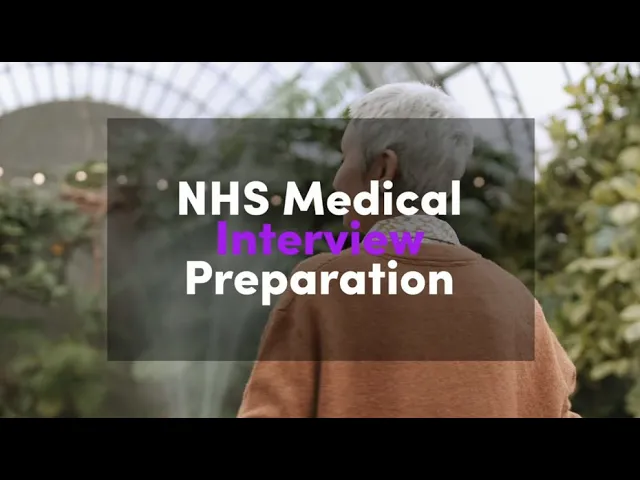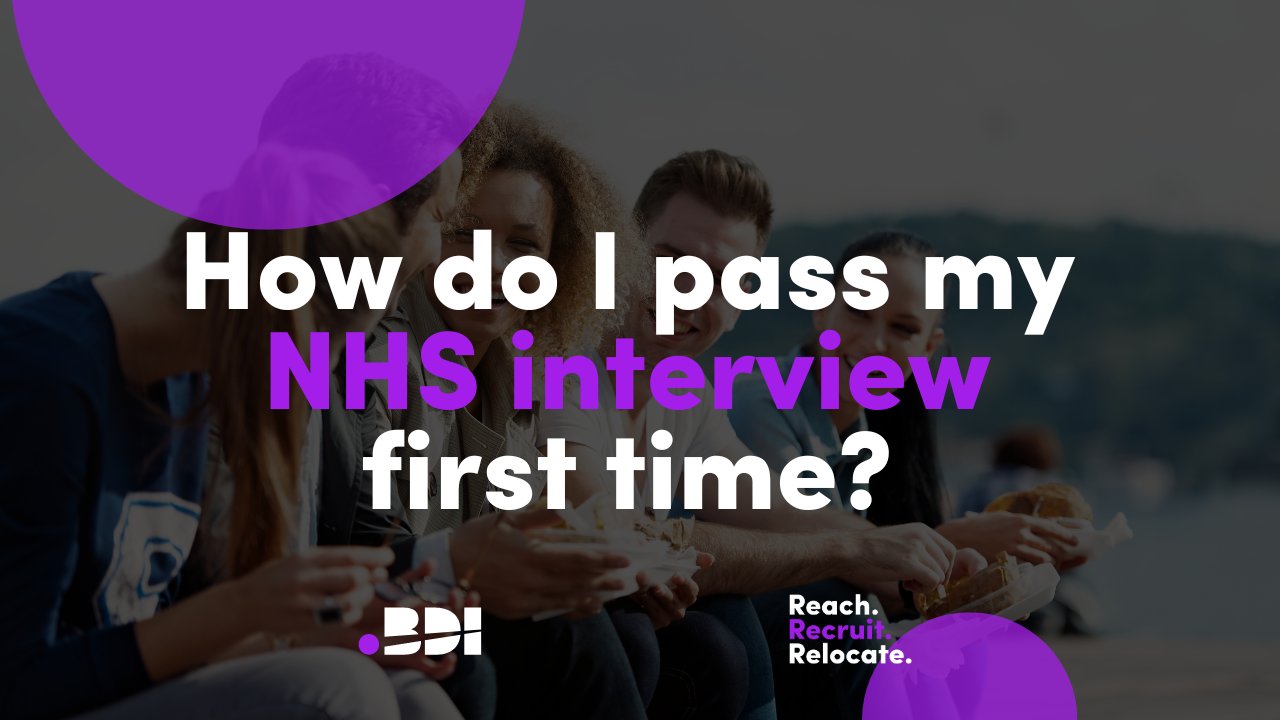NHS Medical Interview Preparation
25 Feb, 202312 Minutes
Being invited to an NHS interview means that you have demonstrated the necessary skills and experience on your CV to be given one. In essence, you’ve impressed them, so congratulations! You are en route to becoming an NHS doctor. However, there is still another hurdle – nailing the NHS medical interview. To do so, you’ll need to prepare. This article teaches you everything you should consider before your medical interview and the techniques to ensure success.
Readers of this article also enjoy our guides on the types of questions to expect during an NHS interview and frequently asked interview questions.
What Research Should You Do?
Once you receive that exciting invitation to the interview, it’s time to begin your research. Here are the most important things you should research before the NHS interview:
The Trust and Department
First, look at the trust and department – you should be able to find a lot of information about them online. Have there been any recent developments? What about the structure of the organisation? Find out as much as you can before the interview date.
The Hospital Values
It’s not just the trust as a whole that you need to research – it’s also their values. What is their vision? What is their strategy? Learn about the hospital’s values and notice how they align with yours. That way, you can prepare questions and answers that prove to the panel that your views are in alignment with the trusts.
Your Particular Role
Research the specific role you are applying for, including what is expected of you. Of course, the panel are already interested in you by your CV but knowing exactly what they want in terms of experience and skillset can help you impress on the interview day.
The Interview Panel
It’s also a good idea to know who will be interviewing you. Learning names is a minimum, you should also find out their specific job roles and skillset. Often, you can find medical professionals on LinkedIn. Knowing more about them means you can tailor more specific questions to them. Plus, it’ll likely help you build rapport in the interview.
What Happens on the Interview Day
Knowing what happens on the day of the interview puts you ahead. As an IMG, the interview will likely take place over Microsoft Teams, a video conferencing software. If you don’t already have Teams, it’s essential to download and familiarise yourself with it beforehand. You should check your internet connection by making a call to a friend or colleague from the place you’ll be during the interview at least twenty-four hours beforehand and then run another test call on the day.
Tasks to Prepare for the NHS Interview
Before the interview date, there are specific tasks you should do to ensure you are fully prepared. They include the following:
Review Your CV
You’ll likely get asked to discuss your CV during the interview, so it’s a good idea to review it beforehand. Know your CV through and through – and be sure you feel comfortable talking through some of its main points, as you may be asked to explain a section in more detail.
Practice Questions
Rehearsing the most frequently asked NHS interview questions with a colleague can give you a leg up. Ask your colleague to ask these questions in a random order so that your reaction is a little more natural – as it would be on the interview day. Then, use their feedback to improve your interviewing skills. You could even record yourself to take notes afterwards.
Prepare Your Own Questions
While most of the NHS interview will involve the interview panel asking you questions, you will have a small window to ask your own at the end. Don’t let this opportunity pass you by. It gives you a chance to learn more about the trust, department, and role in general, and asking questions also shows the panel that you are keen and passionate about the position.
Techniques to Prepare for the Interview
It’s important for IMGs to answer questions clearly and succinctly to make an excellent impression on the panel. Fortunately, there are three great question-answering strategies to do just that: CAMP, STAR, and SPIES. You’ll be far better prepared on interview day by practising your answers with these templates.
CAMP
CAMP can be used to answer the personal questions the panel asks you. It stands for Clinical, Academic, Management, and Person. Using this structure, you can lead the panel through your relevant experience. You’d start with C for Clinical, where you would delve into your medical work experience. From there, you’ll talk about your academic education/qualifications, then your management experience, and finally any relevant personal experience you wish to share (which doesn’t have to be medical based).
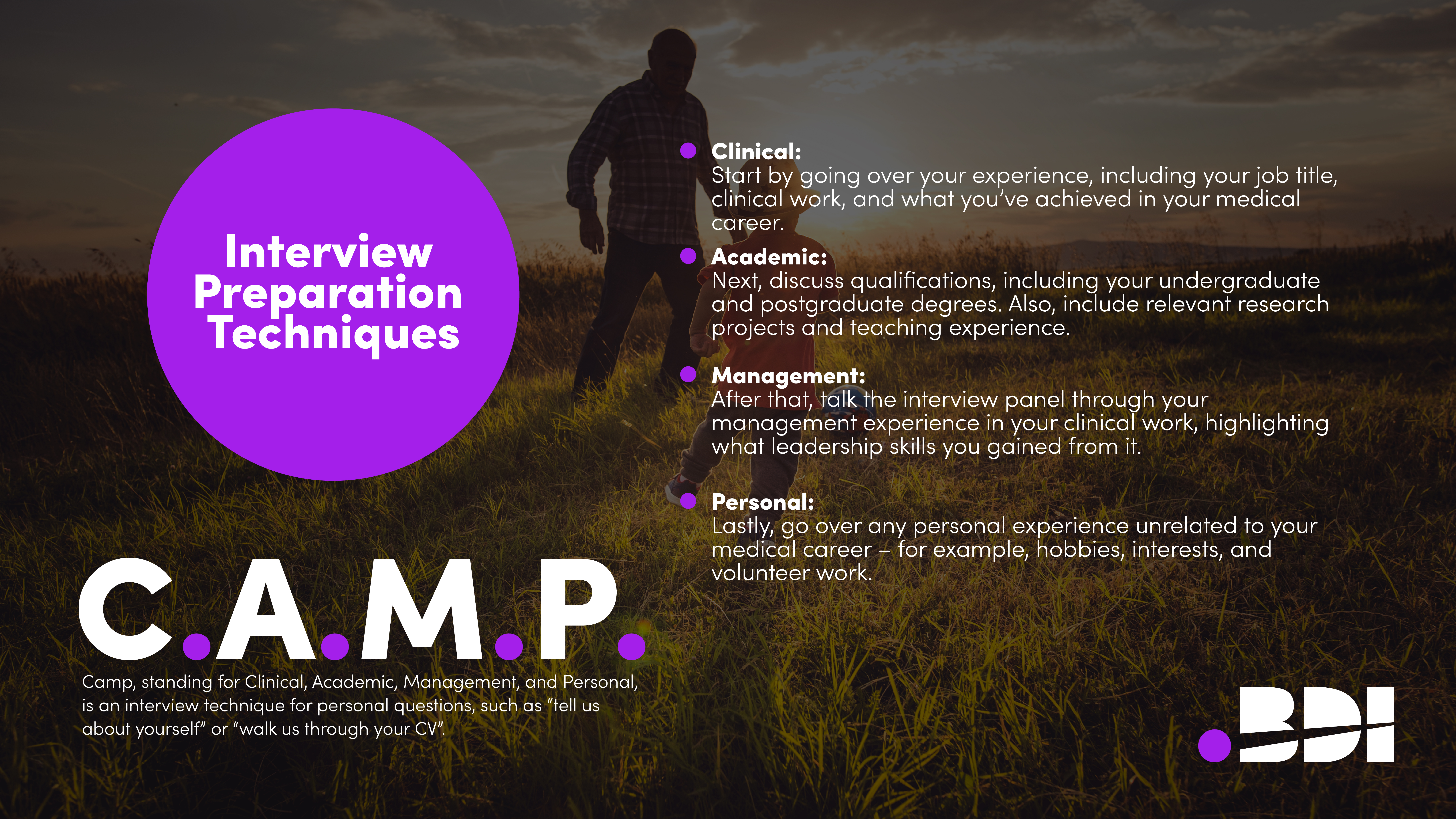
STAR
STAR is used for answering clinical experience questions. It stands for Situation, Task, Action and Result. Here is what each of them means:
- Situation: Explain the clinical situation you experienced; paint the picture for the panel.
- Task: Explain your medical purpose. What tasks were expected of you?
- Action: Next, explain the specific actions you took.
- Result: Finally, discuss the result. What happened? Did you learn anything?
Following this template allows you to walk the panel through your clinical experience clearly yet thoroughly.
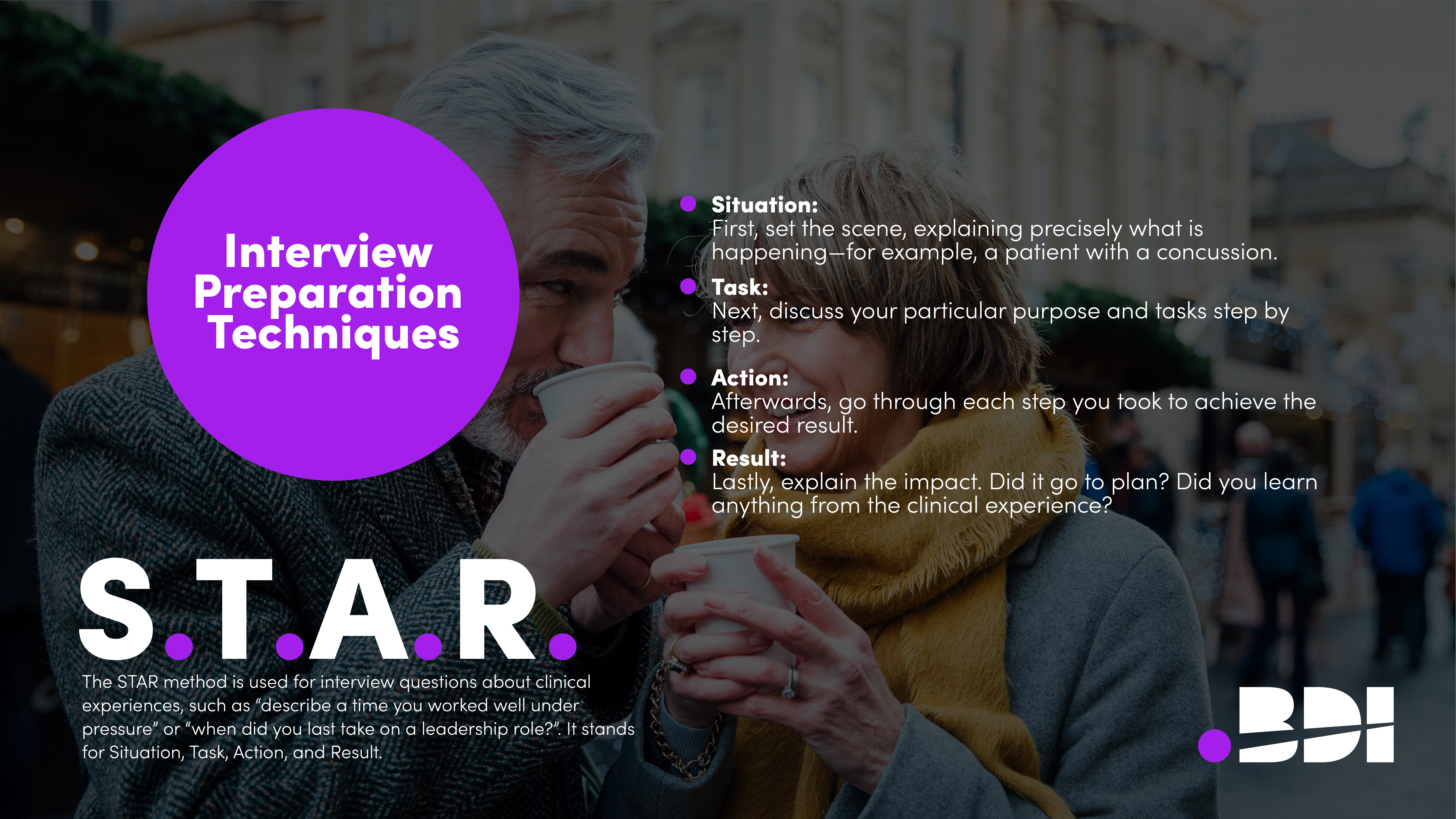
SPIES
The SPIES template works well for clinical scenarios. In NHS interviews, the panel often presents a clinical scenario, and you must answer how you would handle it. It is the SPIES formula that will help you do so:
- Seek Information: First, discuss acquiring all the necessary information.
- Patient Safety: Discuss patient safety, showing it’s your priority.
- Initiative: At the next stage, explain your actions and what you would do to resolve the clinical situation.
- Escalate: Explain how you would involve others if needed.
- Support: Lastly, discuss how you will support your colleagues.
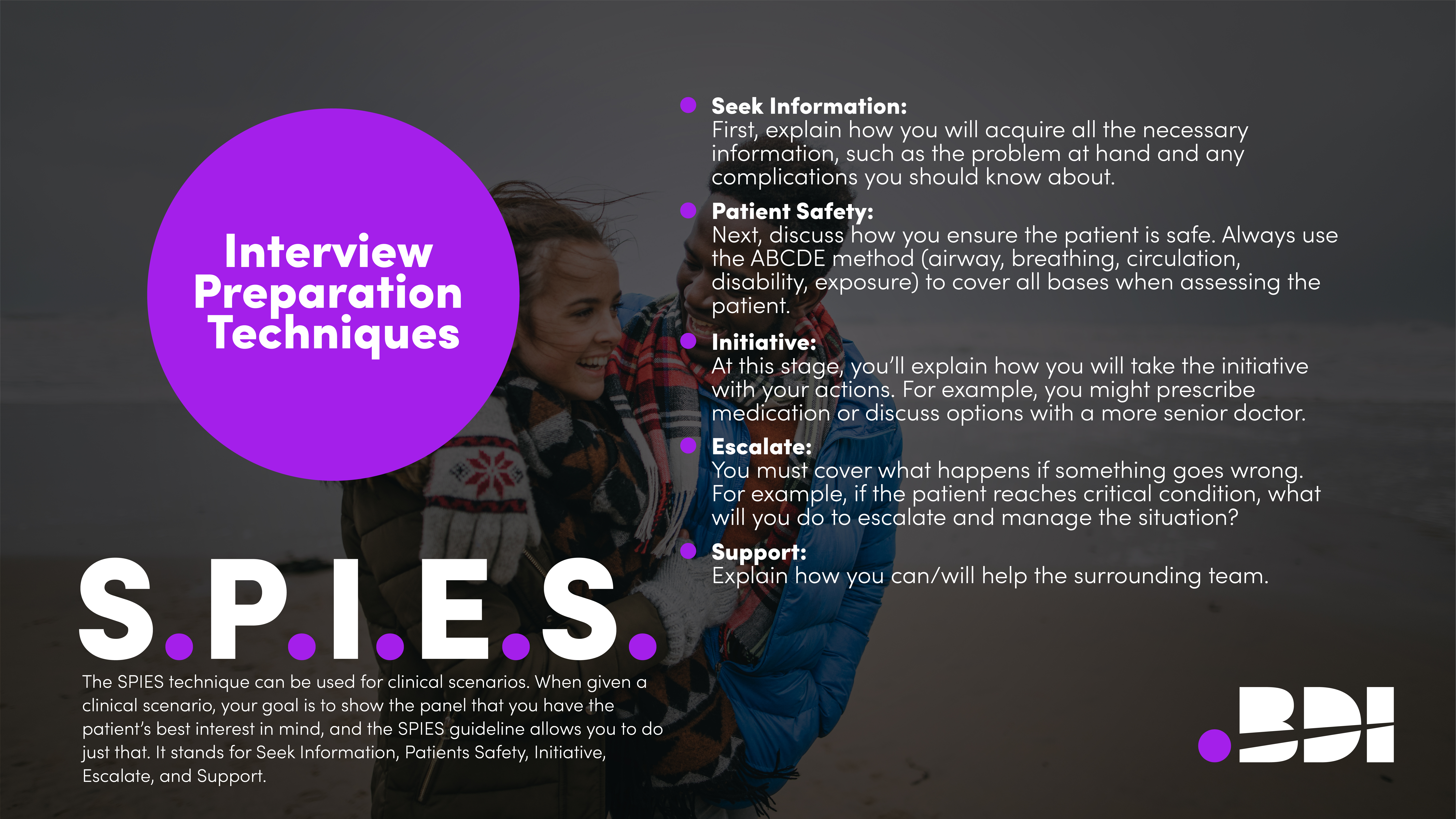
All the above techniques (CAMP, STAR, and SPIES) should be practised to prepare for your interview. Once you nail these formulas, you’ll have a great template to answer the interview questions.
Preparation on the Day
While you will have done most of the interview preparation way before the interview date, there are some things you’ll need to do the day of the interview to ensure you’re ready.
Check you have your Microsoft Teams link
You should have a link to the Teams meeting at least 24 hours before the interview. If you haven’t received a link by this point you should contact the HR team to check everything is still going ahead as planned.
Send a Message
Next, send a message to the hospital’s HR department confirming your attendance and letting them know you are looking forward to meeting the team.
Run a Test Call
Running a test call with a friend or colleagues allows you to ensure everything, including your internet connection, camera and microphone, is working.
Be On Call Before the Starting Time
You don’t want to jump on the interview call just as it’s set to begin – make sure you are prepared and focused in the area you will take the call and join the call five or ten minutes early.
In Summary
Putting in lots of prep before your NHS medical interview is key to impressing the interview panel. When you know what to expect and have time to prepare and rehearse, you can answer the questions with confidence and clarity, which is exactly what the interviewers want!
If you are currently preparing for a medical interview with the NHS then we can help! We have several speciality specific interview preparation guides with example questions for each section of the interview. Get in touch and tell us the grade and specialism you are preparing to interview for if you would like to receive a copy


